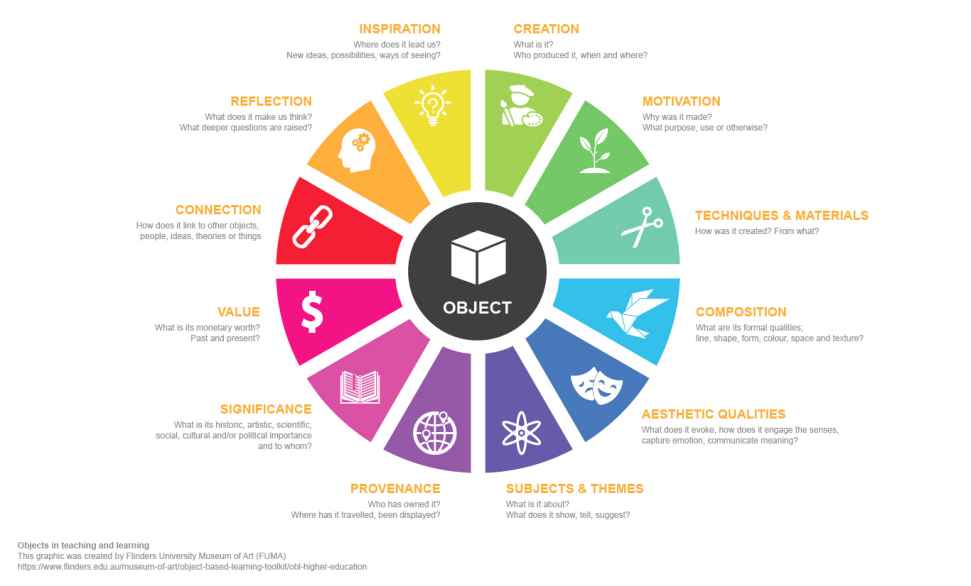Planning OBL learning experiences
- Visible thinking in action has examples of learning activities for visual thinking through art (Project Zero, Harvard Graduate School of Education).
- Think / See / Wonder thinking routine activities and questions to prompt students when exploring works of art (Umma Art exchange, University of Michigan).
- Learning activities and descriptions of sessions can be used to plan gallery learning sessions (Nasher Museum of Art at Duke University).
- Guides for running museum class sessions university-level guidance for planning art museum sessions (Johnston Museum of Art, Cornell University).
- Engaging students with art through short videos to help plan object-based learning experiences across multiple disciplines (Getty Museum).
Learning activities for OBL seminars and tutorials
- Learning activities short list of visual literacy activities to provoke responses to art objects (Duke University).
- How do you look? suggests questions to pose to students about different formats and contexts of art objects (Duke University).
- Teaching objects in the Museum video (duration 3:32 mins) explains how art objects are used in higher education archaeology, including observing and creating art objects (Princeton University).
- A Teacher’s Guide to Visible Thinking Activities has examples of thinking routine activities that could be adapted for higher education (Inquisitive, Australian education company).
- Art object resources can be searched, filtered or viewed by theme or subject. Users can also collate and remix their own collections (Umma Art exchange, University of Michigan).
- Pre and post gallery visit resources for teachers including selecting objects, lesson plans, handouts and slideshows (Umma Art exchange, University of Michigan).
- Math Activity: Measuring Angles is an example of exploring maths through object-based learning. (Umma Art exchange, University of Michigan).
- The Art of Teaching Languages, includes questions, activity ideas for using art in teaching languages through object-based learning (Yale University Art Gallery).
Objects in teaching and learning wheel

The ‘Objects in teaching and learning’ graphic was created by Flinders University Museum of Art (FUMA) in 2019 as part of an ongoing FUMA program supporting cross-disciplinary engagement with the visual arts. It was inspired by the ‘Learning from Objects’ diagram from Learning through Culture, The DfES Museums and Galleries Education Programme: a guide to good practice (2002) DfES publication DfES/0159/2002, page 11. Published by RCMG, Feb 2002.
The graphic is downloadable as a JPG and PDF for wider circulation; please ensure the creator and source is acknowledged.
Further reading
Alvord, E. & Friedlaender, L. (2012). Visual Literacy and the Art of Scientific Inquiry: A Case Study for Institutional and Cross-Disciplinary Collaboration. In: Gold, M. & Jandl, S. (eds), A Handbook for Academic Museums: Exhibitions and Education, Edinburgh, UK.: MuseumsEtc.
Blanco et al. (2008). Formal art observation training improves medical students' visual diagnostic skills. Journal of General Internal Medicine, 23 (7), pp. 991–997. DOI:10.1007/s11606-008-0667-0
Chatterjee, H.J. (2010). Object-based learning in higher education: pedagogical power of museums. Putting University Collections to Work in Teaching and Research – Proceedings of the 9th Conference of the International Committee of ICOM for University Museums and Collections (UMAC), Berkeley, USA, 10th–13th September 2009, pp. 179-182.
Chatterjee, H.J. & Hannan, L. (2015). Engaging the Senses: Object-based Learning in Higher Education, New York, USA.: Routledge.
Duhs, R. (2010). Learning from university museums and collections in higher education: University College London (UCL). In: MacDonald et al. (eds), University Museums and Collections Journal 3: Putting University Collections to Work in Teaching and Research. Proceedings of the 9th Conference of the International Committee of ICOM for University Museums and Collections (UMAC). Berkeley, USA, 10th-13th September 2009, pp.183-186.
Gaunt, H. (2016). Friday essay: can looking at art make for better doctors?, The Conversation, 16 December 2016.
German, S. & Harris, J. (2017). Agile Objects, Journal of Museum Education, 42, 3, pp. 248-257.
DOI: http://dx.doi.org/10.1080/10598650.2017.1336369
Hardie, K. (2015). Innovative pedagogies series: Wow: The power of objects in object-based learning and teaching, York, UK.: Higher Education Academy.
Keogh, C. (2019). Pathways for Empathetic Understanding in Modern and Contemporary Museums, Theory and Practice, 2.
Milkova, L. & Volk, S. S. (2014). Transfer Learning in and through the academic museum. In: Gold, M. & Jandl, S. (eds), A Handbook for Academic Museums: Exhibitions and Education, Edinburgh, UK.: MuseumsEtc.
Morgan, L. (2018). Understanding Dworkin through art: object-based learning and law. The Law Teacher, 52 (1), pp. 53-67.
DOI: http://dx.doi.org/10.1080/03069400.2017.1279437
Rusu, M. (2017). Empathy and communication through art. Review of Artistic Education, 14, pp. 139-146.
Salmon, F. and Wurm, J. (2017), The power of things: enhancing employability in higher education through object-based learning, Canberra, ACT: Australian Government Department of Education and Training.
Need help?
Please don't hesistate to contact FUMA if you require any assistance with using the OBL toolkit, or would like to submit a case study.
If you are interested in working with FUMA to enrich curricula and expand your pedagogical practice through the use of art objects, start by exploring the toolkit and then submit an OBL expression of interest form.
Flinders University Museum of Art
Flinders University I Sturt Road I Bedford Park SA 5042
Located ground floor Social Sciences North building, Humanities Road adjacent carpark 5
Telephone | +61 (08) 8201 2695
Email | museum@flinders.edu.au
Monday to Friday | 10am - 5pm or by appointment
Thursdays | Until 7pm
Closed weekends and public holidays
FREE ENTRY
Flinders University Museum of Art is wheelchair accessible, please contact us for further information.


